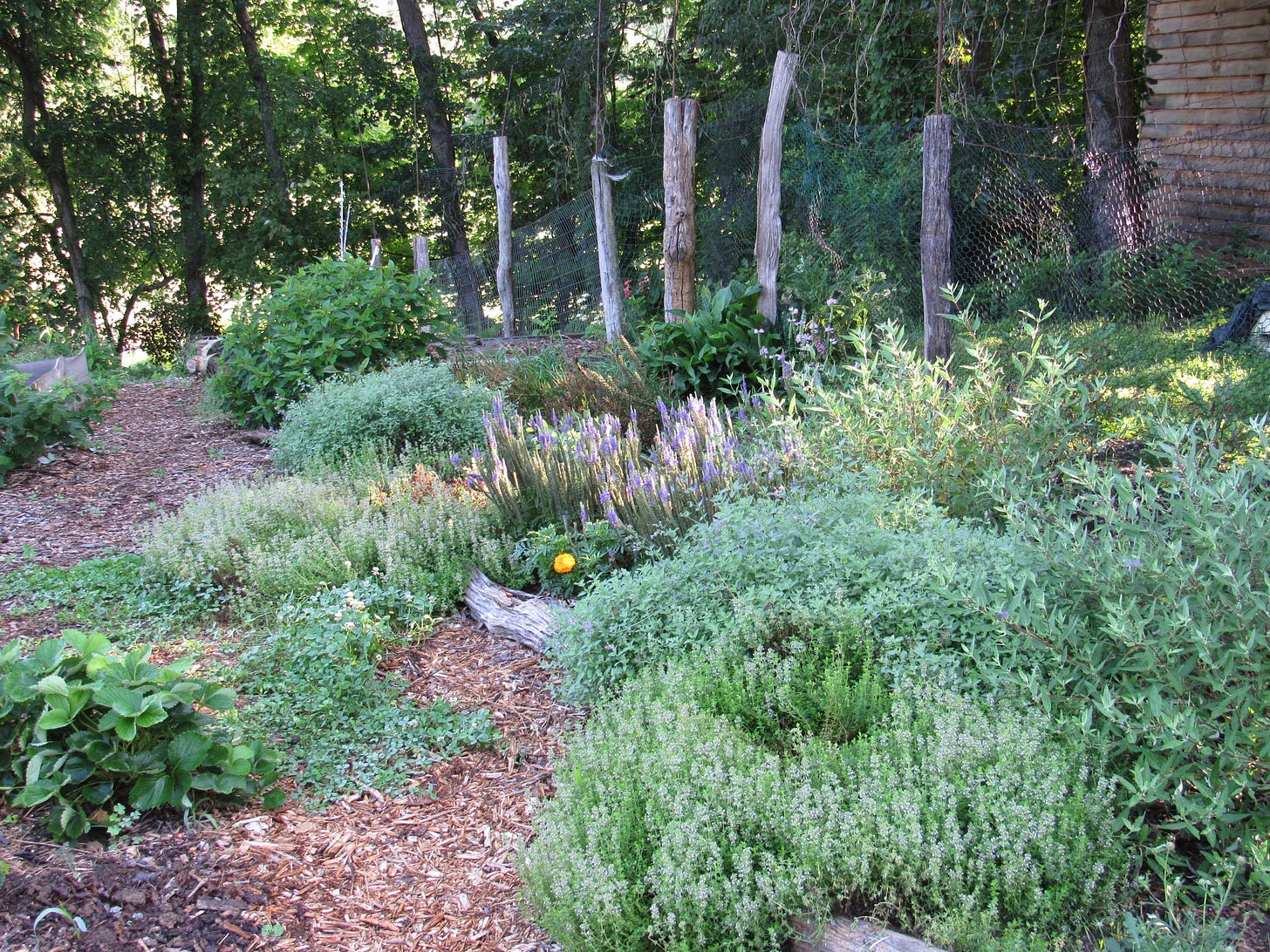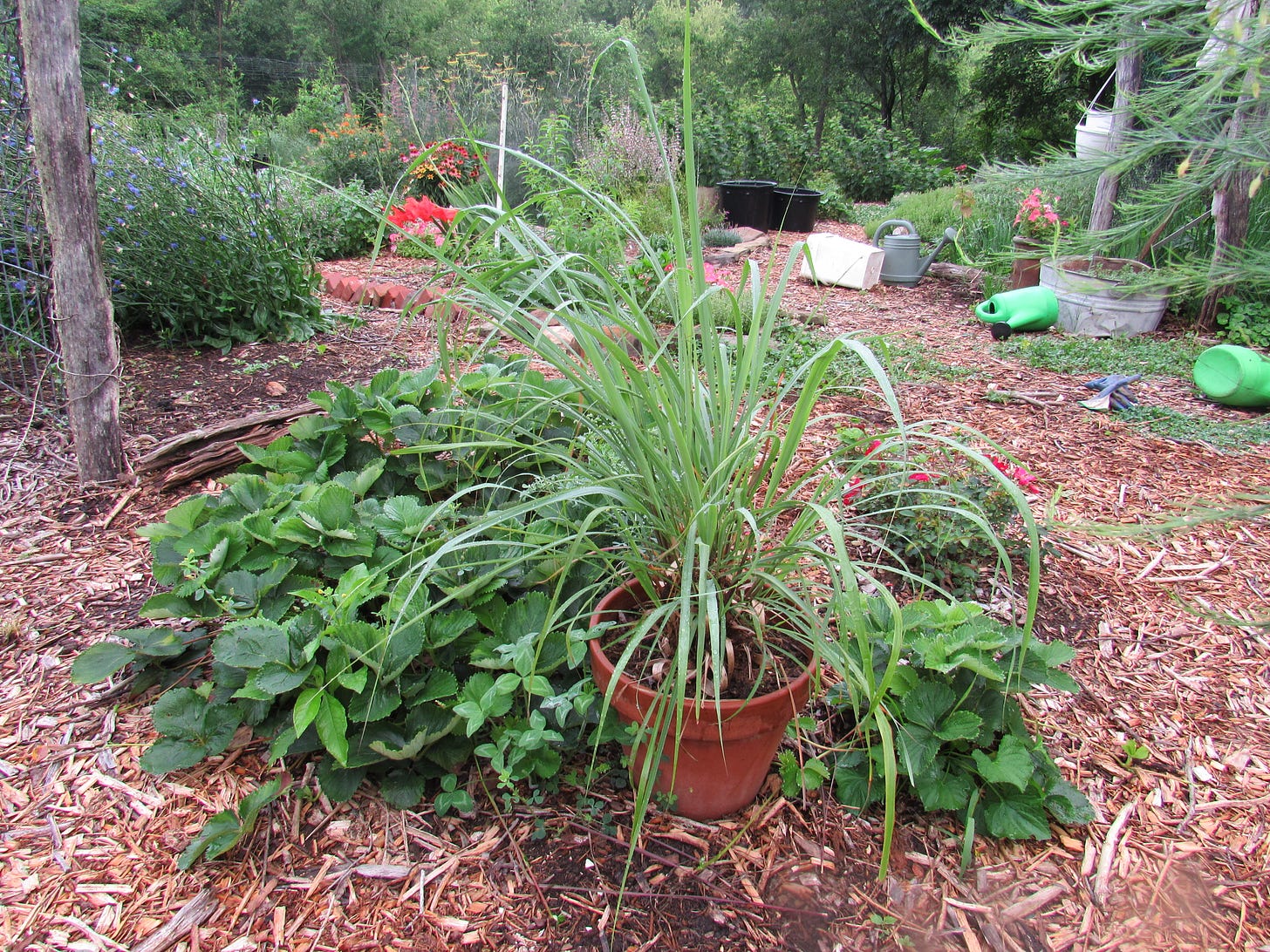Zucchinification
With more vintage photos
Each year in the garden I reach a point where I accept that it is now out of my control. Up to this point I feel I’ve kept up with pruning, weeding, and general garden maintenance. Then the heat prevents me from spending as much time as I should, and I decide to take a day to do something fun like a normal person and — Bam! Suddenly it’s a jungle out there. In a more garden-centered world there would be a name for this transition from tidy, managed state to vegetative chaos, but if one exists, I’m not aware of it. I’m calling it zucchinification because the turning point usually coincides with that other moment that gardeners dread — the day when those cute little baby zucchinis you’ve been keeping your eye on are suddenly monstrous goliaths well past the point of tender perfection. You know what I’m talking about. It happens overnight every single year no matter how vigilant I am.
A few weeks prior to this turning point I have made the decision to give up on suckering the tomatoes. My diligent efforts to pinch and tie notwithstanding, the tomatoes sprawl in several directions, and further containment is futile. About this time, the berries have usually tested my patience also. They just won’t stop growing. I remember the first year I planted everbearing raspberries, and, to my dismay, deer ate them to the ground sometime in fall. Though I didn’t realize it at the time, this was the best case scenario. Deer did the pruning, and I enjoyed a nice crop the following year. That’s the good thing about everbearing fruit: There are several right ways to prune them, deer-powered included, that result is good harvests.
It’s the zucchini explosion that really marks the milestone of a change in the garden, even more so than the summer solstice. It’s much more tangible for one thing. How many of us would be sure exactly when the longest day is reached if not for calendars and social media to remind us? The point in time that marks zucchinification is undeniable. I arrived home from work a few days ago to find several overripe zucchini by the porch steps. Jumping to conclusions, I thought perhaps they had been left by someone living nearby. When my parents were still alive, each fall a neighbor had dropped off bags of turnips on their front porch. Due to the fact that most of the family didn’t care for the vegetable, leaving the onus on me to make good use of them, he became known in my mind as the Turnip Terrorist. Eyeing the zucchini by our stoop, I wondered if similar nefarious forces were at work. Were we the victims of a Zucchini Bomber? A Cucurbit Culprit? Before paranoia took over my son appeared and announced that he had picked them and left them there to be given to the chickens.
Feeding the extra squash, cukes, and tomatoes to then hens solves the problem of what to do with extra veg. The other aspects of zucchinification are not so easily dealt with. I’ll continue to prune and weed when I can, but I am resigned to the fact that the tidy spring garden is gone and weed ands rampant growth are the new norm. The goal at this time becomes keeping up with harvesting as best I can, and mulching empty beds that await late summer plantings so they too aren’t overrun with weeds. The garlic — both regular hardneck and elephant — is now drying on the porch. The potato plants are signalling their approach to harvestable tuber size by flopping and starting to turn yellow. The onions have most likely reached their maximum size but will be left in their beds as long as possible. Last year, due to the difficulty in drying them during days of high humidity and frequent thunderstorms, many rotted after harvest. This year they will be pulled only as needed until harvest can be put off no longer
.
The weeds that encroach on the margins will probably stay. The goal has switched from eradication to keeping them down to manageable size so they don’t shade out desirables or interfere with harvest. In the center of the garden I’ve succeeded in removing most weeds and keeping an orderly space. The farther one strays from this neat zone, the more uncontrolled things become and at the fence wingstem, goldenrod, wild blackberry, and walnut seedings are crashing the party and acting like they belong there. I’ve tried lining the outside of the fence with comfrey and daylilies with limited success. If the garden was in the center of yard I wouldn’t have this problem, but it’s cut out of the edge of the pasture, and such encroachments are inevitable.
Like I’ve done every year, I now vow that I will not allow zucchinification to happen again. Next year will be the one in which I keep up with everything enough to be able to reach each corner of the garden without using a machete. Some progress has been made on this recurring resolution. By re-cardboarding and mulching every path in late winter, I can keep the paths passable until fall. Since the deer/raspberry incident I’ve become much more brutal in my berry pruning. The long term solution is relocating them to another area though: Ideally it will be a semi-wild patch that’s whacked back or mowed occasionally. Berries and tidy veg beds just don’t mix very well.
My vow to keep a less messy garden notwithstanding, I love big plants and the jungly look in certain areas. The outskirts where large plants like banana and dwarf fruit trees grow are very easy to maintain. It’s a no-brainer that removing small weeds from areas with big plants is much easier than keeping big weeds out of areas where low-growing vegetables are located. I went into more detail about this topic in the post below from last summer.
Fighting Nature Less
About a year ago I made some videos about working with nature. (Handy links are below if you'd like to check them out.) Something bothered me at the time about the phrase working with nature—it's banal yes, but more importantly it's relative. There's a continuum of cooperation with nature in agriculture. On one end are hydroponics,…
This week I loaned my phone to someone who needed it much more than I did. I’ve really only missed the camera feature and the ability to easily capture garden images for illustrations. If you’ve noticed everything looks a little different in this post, it’s because all photos are from July, 2017.







Zucchinification! Yes. Now we need a vacation from zucchinification, lol.
“Like I’ve done every year, I now vow that I will not allow zucchinification to happen again. Next year will be the one in which I keep up with everything enough to be able to reach each corner of the garden without using a machete. “
Love this Lynn. I love when Robin Wall Kimmerer talks about eutrophication in relation to house mess. So zuchinification is perfect for garden mess. Mary Oliver has a poem about this too and how much the birds love the garden mess. I have embraced mess this year but now am trying to open more space and tidy some paths for my own enjoyment. Sometimes I get down on myself because my garden doesn’t look like a magazine garden. But I’m trying to focus more on embracing what it is and my vision for it.